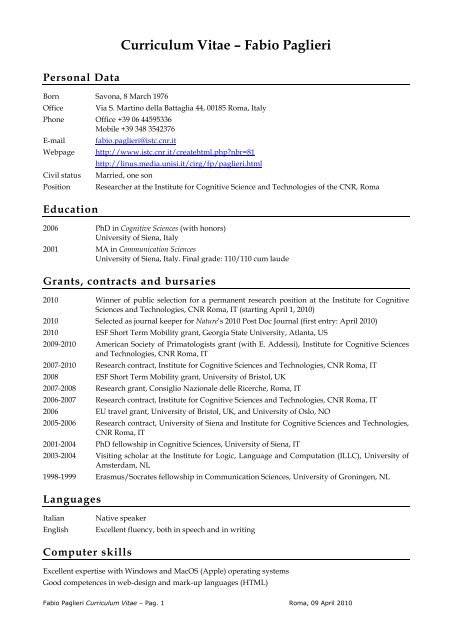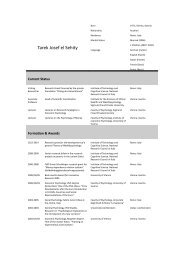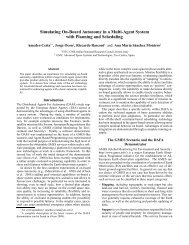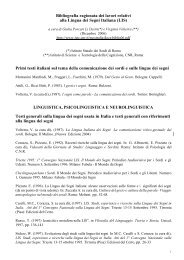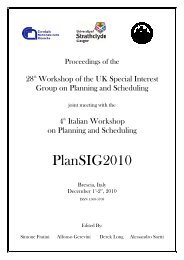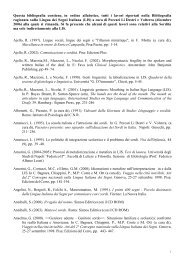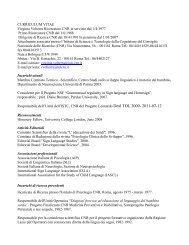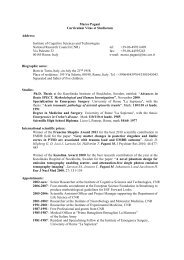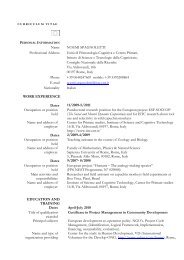Fabio Paglieri - Institute of Cognitive Sciences and Technologies - Cnr
Fabio Paglieri - Institute of Cognitive Sciences and Technologies - Cnr
Fabio Paglieri - Institute of Cognitive Sciences and Technologies - Cnr
Create successful ePaper yourself
Turn your PDF publications into a flip-book with our unique Google optimized e-Paper software.
Curriculum Vitae – <strong>Fabio</strong> <strong>Paglieri</strong><br />
Personal Data<br />
Born Savona, 8 March 1976<br />
Office<br />
Via S. Martino della Battaglia 44, 00185 Roma, Italy<br />
Phone Office +39 06 44595336<br />
Mobile +39 348 3542376<br />
E-mail<br />
Webpage<br />
Civil status<br />
Position<br />
Education<br />
fabio.paglieri@istc.cnr.it<br />
http://www.istc.cnr.it/createhtml.php?nbr=81<br />
http://linus.media.unisi.it/cirg/fp/paglieri.html<br />
Married, one son<br />
Researcher at the <strong>Institute</strong> for <strong>Cognitive</strong> Science <strong>and</strong> <strong>Technologies</strong> <strong>of</strong> the CNR, Roma<br />
2006 PhD in <strong>Cognitive</strong> <strong>Sciences</strong> (with honors)<br />
University <strong>of</strong> Siena, Italy<br />
2001 MA in Communication <strong>Sciences</strong><br />
University <strong>of</strong> Siena, Italy. Final grade: 110/110 cum laude<br />
Grants, contracts <strong>and</strong> bursaries<br />
2010 Winner <strong>of</strong> public selection for a permanent research position at the <strong>Institute</strong> for <strong>Cognitive</strong><br />
<strong>Sciences</strong> <strong>and</strong> <strong>Technologies</strong>, CNR Roma, IT (starting April 1, 2010)<br />
2010 Selected as journal keeper for Nature’s 2010 Post Doc Journal (first entry: April 2010)<br />
2010 ESF Short Term Mobility grant, Georgia State University, Atlanta, US<br />
2009-2010 American Society <strong>of</strong> Primatologists grant (with E. Addessi), <strong>Institute</strong> for <strong>Cognitive</strong> <strong>Sciences</strong><br />
<strong>and</strong> <strong>Technologies</strong>, CNR Roma, IT<br />
2007-2010 Research contract, <strong>Institute</strong> for <strong>Cognitive</strong> <strong>Sciences</strong> <strong>and</strong> <strong>Technologies</strong>, CNR Roma, IT<br />
2008 ESF Short Term Mobility grant, University <strong>of</strong> Bristol, UK<br />
2007-2008 Research grant, Consiglio Nazionale delle Ricerche, Roma, IT<br />
2006-2007 Research contract, <strong>Institute</strong> for <strong>Cognitive</strong> <strong>Sciences</strong> <strong>and</strong> <strong>Technologies</strong>, CNR Roma, IT<br />
2006 EU travel grant, University <strong>of</strong> Bristol, UK, <strong>and</strong> University <strong>of</strong> Oslo, NO<br />
2005-2006 Research contract, University <strong>of</strong> Siena <strong>and</strong> <strong>Institute</strong> for <strong>Cognitive</strong> <strong>Sciences</strong> <strong>and</strong> <strong>Technologies</strong>,<br />
CNR Roma, IT<br />
2001-2004 PhD fellowship in <strong>Cognitive</strong> <strong>Sciences</strong>, University <strong>of</strong> Siena, IT<br />
2003-2004 Visiting scholar at the <strong>Institute</strong> for Logic, Language <strong>and</strong> Computation (ILLC), University <strong>of</strong><br />
Amsterdam, NL<br />
1998-1999 Erasmus/Socrates fellowship in Communication <strong>Sciences</strong>, University <strong>of</strong> Groningen, NL<br />
Languages<br />
Italian<br />
English<br />
Native speaker<br />
Excellent fluency, both in speech <strong>and</strong> in writing<br />
Computer skills<br />
Excellent expertise with Windows <strong>and</strong> MacOS (Apple) operating systems<br />
Good competences in web-design <strong>and</strong> mark-up languages (HTML)<br />
<strong>Fabio</strong> <strong>Paglieri</strong> Curriculum Vitae – Pag. 1 Roma, 09 April 2010
Research interests<br />
<strong>Cognitive</strong> <strong>and</strong> social psychology, cognitive primatology, philosophy <strong>of</strong> mind <strong>and</strong> theories <strong>of</strong> intentional<br />
action, behavioural economics, with special emphasis on the following areas:<br />
the role <strong>of</strong> time in decision-making (intertemporal choice, temporal preferences, time discounting,<br />
impulsivity, self-control)<br />
cognitive analysis <strong>of</strong> intentional processes, in particular re: interactions between motivational <strong>and</strong><br />
epistemic factors (belief-mediated goal-processing)<br />
the role <strong>of</strong> social interactions <strong>and</strong> communication dynamics in the development <strong>of</strong> the self <strong>and</strong> <strong>of</strong><br />
metacognitive capacities (consciousness, mindreading, anticipation)<br />
models <strong>of</strong> belief dynamics <strong>and</strong> theories <strong>of</strong> trust<br />
argumentation theories <strong>and</strong> the study <strong>of</strong> persuasion <strong>and</strong> negotiation<br />
Editorial activities<br />
Naturejobs Postdoc Journal keeper for the year 2010, following public selection. List <strong>of</strong> entries:<br />
07 April 2010: “Fight or flight?”<br />
(http://www.nature.com/naturejobs/2010/100408/full/nj7290-1.html)<br />
22 April 2010: “The junior senior supervisor”, Nature 464, p. 1233 (column)<br />
(http://www.nature.com/naturejobs/2010/100422/pdf/nj7292-1233b.pdf)<br />
28 July 2010: “Discipline beyond disciplines”<br />
(http://www.nature.com/naturejobs/2010/100729/full/nj7306-1.html)<br />
Associate Editor <strong>of</strong> Topoi. An International Review <strong>of</strong> Philosophy, jointly with Pr<strong>of</strong> Ermanno Bencivenga,<br />
General Editor (since 2007)<br />
Series editor <strong>of</strong> Studies in Logic <strong>and</strong> Argumentation (with D. Gabbay, T. Bench-Capon, P. M. Dung, M. Guarini,<br />
L. Rips, J. Woods), College Publications, London (since 2008)<br />
Member <strong>of</strong> the Editorial Board <strong>of</strong> Argument & Computation <strong>and</strong> Sistemi Intelligenti (since 2009)<br />
Referee for the following journals (since 2004):<br />
Synthese; Erkenntnis; IEEE Intelligent Systems; Journal <strong>of</strong> Philosophical Logic; Journal <strong>of</strong> Applied Logic; Topoi;<br />
<strong>Cognitive</strong> Processing; <strong>Cognitive</strong> Systems Research; Argumentation; Argument & Computation; Informal Logic;<br />
Computers & Education; International Journal <strong>of</strong> Artificial Intelligence; JASSS; Giornale Italiano di Psicologia;<br />
Sistemi Intelligenti<br />
Publications<br />
Books<br />
<strong>Paglieri</strong>, F., Castelfranchi, C. (in preparation). Mindful arguments: a cognitive approach to argumentation.<br />
College Publications, London.<br />
Journal articles<br />
<strong>Paglieri</strong>, F. (in preparation). “Two meanings <strong>of</strong> waiting: reflections on anomalous data in intertemporal<br />
choice”.<br />
<strong>Paglieri</strong> F., Addessi E., Focaroli V., Rossi S., Sbaffi A., Tasselli I., Delfino A. (submitted). “What are you<br />
waiting for? Effects <strong>of</strong> reward type on motivation in intertemporal choice”. Journal <strong>of</strong> Behavioral Decision<br />
Making.<br />
Addessi, E., <strong>Paglieri</strong>, F., Focaroli, V. (submitted). “The ecological rationality <strong>of</strong> delay tolerance: insights from<br />
capuchin monkeys”. Cognition.<br />
<strong>Paglieri</strong>, F., Woods, J. (in press). “Enthymematic parsimony”. Synthese, doi: 10.1007/s11229-009-9652-3.<br />
<strong>Paglieri</strong>, F. (2010). “La struttura temporale dell’azione intenzionale: illusione della volontà o illusione delle<br />
neuroscienze?”. Sistemi Intelligenti 22 (2), pp. 347-355.<br />
<strong>Paglieri</strong>, F., Castelfranchi, C. (2010). “Why arguing? Towards a costs-benefits analysis <strong>of</strong> argumentation”.<br />
Argument & Computation 1 (1), pp. 71-91.<br />
<strong>Paglieri</strong>, F. (2009). “La filos<strong>of</strong>ia sperimentale: distinzioni e cautele”. Sistemi Intelligenti 21 (2), pp. 355-369.<br />
<strong>Fabio</strong> <strong>Paglieri</strong> Curriculum Vitae – Pag. 2 Roma, 22 September 2010
<strong>Paglieri</strong>, F., Castelfranchi, C. (2008). “More than control freaks: Evaluative <strong>and</strong> motivational functions <strong>of</strong><br />
goals”. Behavioral <strong>and</strong> Brain <strong>Sciences</strong> 31 (1), pp. 35-36.<br />
<strong>Paglieri</strong>, F., Castelfranchi, C. (2008). “Decidere il futuro: scelta intertemporale e teoria degli scopi”. Giornale<br />
Italiano di Psicologia 35 (4), pp. 739-771 (target article).<br />
<strong>Paglieri</strong>, F., Castelfranchi, C. (2008). “Il futuro non è deciso: risposte ai commenti”. Giornale Italiano di<br />
Psicologia 35 (4), pp. 803-818 (reply to commentaries).<br />
<strong>Paglieri</strong>, F., Castelfranchi, C. (2008). “Cambiare la mente: mindreading, azione intenzionale e coscienza”.<br />
Sistemi Intelligenti 20 (3), pp. 489-520.<br />
<strong>Paglieri</strong>, F., Manzotti, R. (2008). “La coscienza nelle scienze cognitive”. Sistemi Intelligenti 20 (3), pp.365-369.<br />
<strong>Paglieri</strong>, F. (2007). “Changing minds: The role <strong>of</strong> beliefs in cognitive dynamics”. Synthese 155 (2), pp. 163-166.<br />
Castelfranchi, C., <strong>Paglieri</strong>, F. (2007). “The role <strong>of</strong> beliefs in goal dynamics: Prolegomena to a constructive<br />
theory <strong>of</strong> intentions”. Synthese 155 (2), pp. 237-263.<br />
<strong>Paglieri</strong>, F. (2006). “Regole di gioco e norme sociali: crescere fra obbedienza e trasgressione”. Cittadini in<br />
crescita 2/2006, pp. 44-61.<br />
<strong>Paglieri</strong>, F. (2005). “Play, games, <strong>and</strong> philosophy”. Topoi 24 (2), pp. 117-123.<br />
<strong>Paglieri</strong>, F. (2005). “Playing by <strong>and</strong> with the rules: Norms <strong>and</strong> morality in play development”. Topoi 24 (2),<br />
pp. 149-167.<br />
<strong>Paglieri</strong>, F. (2003). “Progettare il gioco. Elementi di interazione ludica nel nuovo parco”. Il Veltro 47, pp. 295-<br />
310.<br />
<strong>Paglieri</strong>, F. (2002). “Credendo di giocare. Verso un’interpretazione cognitivista dei processi ludici”. Sistemi<br />
Intelligenti 14 (3), pp. 371-415.<br />
Edited books<br />
<strong>Paglieri</strong>, F., Castelfranchi, C. (eds.) (in preparation). Consciousness in interaction: the role <strong>of</strong> the natural <strong>and</strong> social<br />
environment in shaping consciousness. John Benjamins, Amsterdam.<br />
Edited journal issues<br />
<strong>Paglieri</strong>, F., Tsakiris, M., Vierkant, T. (eds.) (2009)<br />
Title: Consciousness studies<br />
Special issue <strong>of</strong> Psyche, 15 (1), February 2009<br />
<strong>Paglieri</strong>, F., Manzotti, R. (eds.) (2008)<br />
Title: La coscienza nelle scienze cognitive<br />
Special issue <strong>of</strong> Sistemi Intelligenti, 20 (3), December 2008<br />
<strong>Paglieri</strong>, F. (ed.) (2007)<br />
Title: Changing minds: The role <strong>of</strong> beliefs in cognitive dynamics<br />
Special issue <strong>of</strong> Synthese: Knowledge, Rationality, <strong>and</strong> Action, 155 (2), March 2007<br />
<strong>Paglieri</strong>, F. (ed.) (2005)<br />
Title: Play, Games <strong>and</strong> Philosophy<br />
Special issue <strong>of</strong> Topoi, 24 (2), September 2005<br />
Book chapters<br />
<strong>Paglieri</strong>, F. (in press). “There’s nothing like being free: default dispositions, judgments <strong>of</strong> freedom, <strong>and</strong> the<br />
phenomenology <strong>of</strong> coercion”. In T. Vierkant, J. Kiverstein, A. Clark (eds.), Decomposing the will, Oxford<br />
University Press, Oxford.<br />
<strong>Paglieri</strong>, F. (2010). “Committed to argue: on the cognitive roots <strong>of</strong> dialogical commitments”. In C. Reed, C.<br />
Tindale (eds.), Dialectics, dialogue <strong>and</strong> argumentation. An examination <strong>of</strong> Douglas Walton’s theories <strong>of</strong> reasoning,<br />
London, College Publications, pp. 59-71.<br />
<strong>Paglieri</strong>, F., Castelfranchi, C. (2010). “In parsimony we trust: non-cooperative roots <strong>of</strong> linguistic<br />
cooperation”. In A. Capone (ed.), Perspectives on language use <strong>and</strong> pragmatics, Lincom Europa, München, pp.<br />
99-117.<br />
<strong>Paglieri</strong>, F. (2009). “Acceptance as conditional disposition”. In A. Hieke, H. Leitgeb (eds.), Reduction: between<br />
the mind <strong>and</strong> the brain, Ontos-Verlag, Berlin, pp. 29-49.<br />
<strong>Paglieri</strong>, F., Woods, J. (2009). “Il problema degli entimemi: carità o parsimonia?”. In P. Cantù, A. Cattani, I.<br />
Testa, P. Vidali (eds.), Pratica e teoria dell’argomentazione, L<strong>of</strong>fredo Editore, Napoli, pp. 109-122.<br />
<strong>Fabio</strong> <strong>Paglieri</strong> Curriculum Vitae – Pag. 3 Roma, 22 September 2010
<strong>Paglieri</strong>, F., Castelfranchi, C. (2006). “The Toulmin test: Framing argumentation within belief revision<br />
theories”. In D. Hitchcock, B. Verheij (eds.), Arguing on the Toulmin Model: New essays in argument analysis <strong>and</strong><br />
evaluation, Springer, Berlin, pp. 359-377.<br />
<strong>Paglieri</strong>, F., Castelfranchi, C. (2005). “Revising beliefs through arguments: bridging the gap between belief<br />
revision <strong>and</strong> argumentation in MAS”. In I. Rahwan, P. Moratïs, C. Reed (eds.), Argumentation in Multi-Agent<br />
Systems, Springer, Berlin, pp. 78-94.<br />
<strong>Paglieri</strong>, F. (2003). “Il gioco di ruolo come sistema complesso: conseguenze pedagogiche e terapeutiche”. In<br />
A. Angiolillo, L. Giuliano, B. Sidoti (a cura di), Inventare destini: il gioco di ruolo nelle scuole italiane, Bari, La<br />
Meridiana, pp. 137-142.<br />
Proceedings<br />
<strong>Paglieri</strong>, F. (submitted). “Choosing to argue: towards a theory <strong>of</strong> argumentative decision-making”. In H.<br />
Hansen, C. Tindale, R. Johnson, J. Blair (eds.), Argumentation: Cognition & Community. Proceedings <strong>of</strong> OSSA<br />
2011, CD-ROM, OSSA, Windsor.<br />
<strong>Paglieri</strong>, F., Woods, J. (in press). “Enthymemes: from reconstruction to underst<strong>and</strong>ing”. In F. van Eemeren, B.<br />
Garssen, A. Blair, G. Mitchell (eds.), Proceedings <strong>of</strong> ISSA 2010, Sic Sat, Amsterdam.<br />
Hample, D., <strong>Paglieri</strong>, F., Na, L. (in press). “The costs <strong>and</strong> benefits <strong>of</strong> arguing: predicting the decision whether<br />
to engage or not”. In F. van Eemeren, B. Garssen, A. Blair, G. Mitchell (eds.), Proceedings <strong>of</strong> ISSA 2010, Sic Sat,<br />
Amsterdam.<br />
<strong>Paglieri</strong>, F. (2009). “Ruinous arguments: Escalation <strong>of</strong> disagreement <strong>and</strong> the dangers <strong>of</strong> arguing”. In H.<br />
Hansen, C. Tindale, R. Johnson, J. Blair (eds.), Argument Cultures: Proceedings <strong>of</strong> OSSA 2009, CD-ROM, OSSA,<br />
Windsor.<br />
<strong>Paglieri</strong>, F. (2007). “No more charity, please! Enthymematic parsimony <strong>and</strong> the pitfall <strong>of</strong> benevolence”. In H.<br />
Hansen, C. Tindale, R. Johnson, A. Blair (eds.), Dissensus <strong>and</strong> the search for common ground: Proceedings <strong>of</strong><br />
OSSA 2007, OSSA, Windsor.<br />
<strong>Paglieri</strong>, F., Castelfranchi, C. (2007). “Belief <strong>and</strong> acceptance in argumentation. Towards an epistemological<br />
taxonomy <strong>of</strong> the uses <strong>of</strong> argument”. In J. A. Blair, F. H. van Eemeren, C. A. Willard (eds.), Proceedings <strong>of</strong> ISSA<br />
2006, Sic Sat, Amsterdam.<br />
<strong>Paglieri</strong>, F., Castelfranchi, C. (2007). “What do we argue for? A goal-oriented taxonomy <strong>of</strong> the uses <strong>of</strong><br />
argument”. In C. Reed, F. Grasso, R. Kibble (eds.), CMNA VII – Computational models <strong>of</strong> natural argument,<br />
IJCAI, Hyderabad, pp. 42-48.<br />
<strong>Paglieri</strong>, F., Castelfranchi, C. (2006). “Menti e argomenti: per un’analisi cognitiva delle pratiche<br />
argomentative”. In A. Greco, C. Penco, G. S<strong>and</strong>ini, R. Zaccaria (eds.), Scienze cognitive e robotica, Erga<br />
Edizioni, Genova, pp. 121-126.<br />
<strong>Paglieri</strong>, F., McKay, R. (2006). “Believing without accepting: The doxastic conception <strong>of</strong> delusions revised”.<br />
In Cervelli, persone e società. Atti del VII congresso nazionale SIFA, Università Vita-Salute, Cesano Maderno (MI),<br />
pp. 113-115.<br />
McKay, R., <strong>Paglieri</strong>, F. (2006). “A computational model <strong>of</strong> the Capgras delusion”. In B. M. Velichkovsky et al.<br />
(eds.), Proceedings <strong>of</strong> the 2 nd Biennial Conference on <strong>Cognitive</strong> Science, Russian Association for <strong>Cognitive</strong> Studies,<br />
St. Petersburgh, pp. 111-112.<br />
<strong>Paglieri</strong>, F. (2005). “See what you want, believe what you like: Relevance <strong>and</strong> likeability in belief dynamics”.<br />
In L. Cañamero (ed.), Agents that want <strong>and</strong> like: Motivational <strong>and</strong> emotional roots <strong>of</strong> cognition <strong>and</strong> action, AISB,<br />
Hatfield UK, pp. 90-97.<br />
<strong>Paglieri</strong>, F., Castelfranchi, C. (2005). “Influence <strong>of</strong> social motivation over belief dynamics: A game-theoretical<br />
analysis”. In B. Kokinov (ed.), Advances in <strong>Cognitive</strong> Economics, NBU Press, S<strong>of</strong>ia, pp. 202-213.<br />
<strong>Paglieri</strong>, F., Castelfranchi, C. (2005). “Arguments as belief structures: towards a Toulmin layout <strong>of</strong> doxastic<br />
dynamics?”. In D. Hitchcock (ed.), The uses <strong>of</strong> argument: Proceedings <strong>of</strong> OSSA 2005, OSSA, Hamilton, pp. 356-<br />
367.<br />
<strong>Paglieri</strong>, F. (2004). “Data-oriented Belief Revision: towards a unified theory <strong>of</strong> epistemic processing”. In E.<br />
Onaindia, S. Staab (eds.), Proceedings <strong>of</strong> STAIRS 2004, Amsterdam, IOS Press, pp. 179-190.<br />
<strong>Paglieri</strong>, F. (2004). “Cambiare idea: dai modelli formali della belief revision ad architetture cognitive per<br />
agenti realistici”. In Lavoro e scienze cognitive: ambienti, tecnologie, attività – Atti del II convegno nazionale AISC,<br />
Interaction Design <strong>Institute</strong>, Ivrea (TO), pp. 59-61.<br />
<strong>Paglieri</strong>, F., Castelfranchi, C. (2004). “Argumentation <strong>and</strong> data-oriented belief revision: on the two-sided<br />
nature <strong>of</strong> epistemic change”. In F. Grasso, G. Carenini, C. Reed (eds.), Proceedings CMNA IV, ECAI, Valencia,<br />
<strong>Fabio</strong> <strong>Paglieri</strong> Curriculum Vitae – Pag. 4 Roma, 22 September 2010
pp. 5-12.<br />
Book reviews<br />
<strong>Paglieri</strong>, F. (2008). “Critical notice <strong>of</strong> Reason Reclaimed”. Informal Logic 28 (2), pp. 170-192.<br />
<strong>Paglieri</strong>, F. (2004). “Walton’s Abductive Reasoning”. Informal Logic 24 (3), pp. 271-277.<br />
Dissertations<br />
<strong>Paglieri</strong>, F. (2006). Belief dynamics: from formal model to cognitive architectures, <strong>and</strong> back again. PhD dissertation<br />
in <strong>Cognitive</strong> <strong>Sciences</strong>, University <strong>of</strong> Siena. Main advisor C. Castelfranchi; secondary advisor C. Pizzi.<br />
<strong>Paglieri</strong>, F. (2001). Le ragioni del gioco. Funzioni biologiche del comportamento ludico: verso una teoria della mente in<br />
gioco. BA thesis in Communication <strong>Sciences</strong>, University <strong>of</strong> Siena. Main advisor C. Castelfranchi; secondary<br />
advisor E. Bencivenga.<br />
Conference talks <strong>and</strong> scientific presentations (sample)<br />
2010 “Enthymemes: from reconstruction to underst<strong>and</strong>ing”, ISSA 2010 conference, Amsterdam, 2<br />
July 2010<br />
2010 “What are you waiting for? The effect <strong>of</strong> reward type on tolerance for delay in capuchins <strong>and</strong><br />
humans”, LRC Seminar, Atlanta, 22 February 2010<br />
2009 “Self-control as a social problem”, CNCC Final Conference, Edinburgh, 4 October 2009<br />
2009 “Nobody likes to wait in vain: the evolutionary roots <strong>of</strong> impulsivity”, Conference Evolution,<br />
Co-operation & Rationality, Bristol, 19 September 2009<br />
2009 “Why argue? Towards a cost-benefit analysis <strong>of</strong> argumentation”, Argumentation Day @<br />
MALLOW 2009, Torino, 11 September 2009<br />
2009 “Ruinous arguments: Escalation <strong>of</strong> disagreement <strong>and</strong> the dangers <strong>of</strong> arguing”, OSSA 2009<br />
conference, Windsor, 4 June 2009<br />
2009 “Playing with oneself: Willpower, self-control, <strong>and</strong> game theory”, Philosophy <strong>and</strong> History <strong>of</strong><br />
Science seminar, Bristol, 29 April 2009<br />
2008 “The self is not a free market: Cooperation <strong>and</strong> competition in intrapersonal dilemmas”,<br />
CONTACT workshop, Bristol, 11 December 2008<br />
2008 “Bundling problems: A critique <strong>of</strong> Ainslie’s theory <strong>of</strong> willpower”, PPNB 2008 conference,<br />
Edinburgh, 26 June 2008<br />
2008 “Parsimonious enthymemes: How scant resources affect argument reconstruction”,<br />
Philosophy <strong>and</strong> History <strong>of</strong> Science seminar, Bristol, 27 February 2008<br />
2007 “Beyond temptations <strong>and</strong> distractions: Metacognitive skills for intertemporal coordination”,<br />
CNCC Conference, Paris, 12-13 July 2007<br />
2007 “From mindreading to mindchanging: the influence function <strong>of</strong> metacognition <strong>and</strong> its import<br />
for self-consciousness”, EuroCogSci 2007, Delphi, 23-27 May 2007<br />
2006 “The role <strong>of</strong> beliefs in goal dynamics: prolegomena to a constructive theory <strong>of</strong> intentions”,<br />
ILIKS annual meeting, Trento, 30 November 2006<br />
2006 “From mindreading to mindchanging: ToM, argumentation, <strong>and</strong> belief change”, NIAS<br />
Workshop, Wassenaar, 26 September 2006<br />
2006 “Argumentation <strong>and</strong> belief revision”, Workshop Argumentation in Science Education,<br />
Bristol, 27-28 March 2006<br />
2005 “Data, beliefs, <strong>and</strong> acceptances: Ontology <strong>and</strong> dynamics <strong>of</strong> doxastic states”, ESF Exploratory<br />
Workshop, Siena, 17-19 November 2005<br />
2005 “Influence <strong>of</strong> social motivation over belief dynamics: A game-theoretical analysis”,<br />
Conference <strong>Cognitive</strong> Economics, S<strong>of</strong>ia, 5-8 August 2005<br />
2004 “Data-oriented Belief Revision: towards a unified theory <strong>of</strong> epistemic processing”, STAIRS<br />
2004 symposium, Valencia, 23-24 August 2004<br />
2004 “AGM belief revision vs. cognitive models”, ILLC advanced seminar, Amsterdam, 26<br />
February 2004<br />
<strong>Fabio</strong> <strong>Paglieri</strong> Curriculum Vitae – Pag. 5 Roma, 22 September 2010
Research projects design, management, evaluation (sample)<br />
Member <strong>of</strong> the ESF Review Panel for the assessment <strong>of</strong> research proposals presented under the calls <strong>of</strong> the<br />
European Science Foundation, since May 2006<br />
Member <strong>of</strong> the Advisory Board <strong>of</strong> the European Society for Multi-Agent Systems (EUMAS) for 2007-2009<br />
Member <strong>of</strong> the Board <strong>of</strong> Directors <strong>of</strong> the European Association for Multi-Agent Systems (EURAMAS), since<br />
December 2009.<br />
Coordinator <strong>of</strong> the following research projects:<br />
INTERCONS: Intersubjective Constructions: Argumentation, Underst<strong>and</strong>ing, <strong>and</strong> Complex Social Cognition. IP<br />
unit within EuroUnderst<strong>and</strong>ing ESF-EuroCORES programme, June 2010<br />
Temporal preferences <strong>and</strong> self-control: interdisciplinary perspectives. ESF Exploratory Workshop, April 2010<br />
Intertemporal choices for primary <strong>and</strong> secondary rewards: how capuchin monkeys <strong>and</strong> humans discount time with<br />
food <strong>and</strong> tokens. ASP General Small Grant (with E. Addessi), August 2009<br />
L’impazienza vien mangi<strong>and</strong>o? Scelta intertemporale, tipo di rinforzo e tempi di consumo: primati umani e non<br />
umani a confronto. ISTC intramural grant (with E. Addessi), May 2009<br />
Argomentazione e identità nella società della conoscenza: gli effetti della multiculturalità e delle nuove tecnologie.<br />
Research project under the CNR call “Promozione Ricerca 2005 – Progetto Giovani”, May 2006<br />
CONTACT: Consciousness in Interaction: The Role <strong>of</strong> the Natural <strong>and</strong> Social Environment in Shaping<br />
Consciousness. CRP consortium for CNCC ESF-EuroCORES programme, January 2006<br />
DiCSI: Le Dinamiche della Conoscenza nella Società dell’Informazione. PRIN 2005 project, April 2005<br />
UDK: Underst<strong>and</strong>ing the Dynamics <strong>of</strong> Knowledge. ESF Exploratory Workshop, May 2004<br />
Changing Minds: <strong>Cognitive</strong>, Computational <strong>and</strong> Logical Approaches to Belief Change. NWO research<br />
workshop, February 2004<br />
Further information <strong>and</strong> updates<br />
Institutional homepage: http://www.istc.cnr.it/createhtml.php?nbr=81<br />
Personal homepage: http://linus.media.unisi.it/cirg/fp/paglieri.html<br />
The treatment <strong>of</strong> personal data is authorized, in compliance with the Italian Law (D.L. 675/1996).<br />
Roma, 22 September 2010<br />
Signed,<br />
FABIO PAGLIERI<br />
<strong>Fabio</strong> <strong>Paglieri</strong> Curriculum Vitae – Pag. 6 Roma, 22 September 2010


